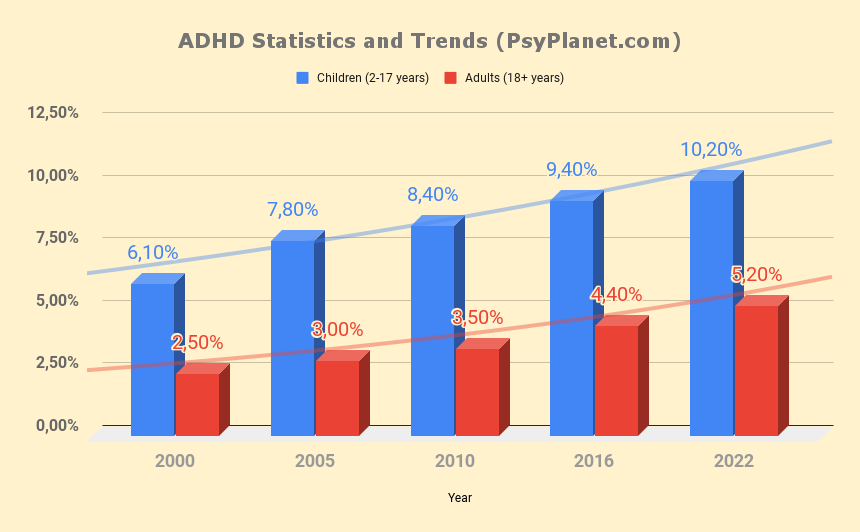ADHD

What is ADHD?
Attention-Deficit/Hyperactivity Disorder (ADHD) is a neurobehavioral condition characterized by persistent symptoms of inattention, distractibility, hyperactivity, and impulsivity. It is one of the most common mental health disorders among children, affecting approximately 5-11% of the global pediatric population. In adults, the prevalence ranges from 2-5%.
Symptoms and Manifestations
This disorder impacts various aspects of life, including work, academic performance, household responsibilities, and personal relationships. Common challenges include:
- Difficulty Concentrating: Trouble focusing on tasks or conversations.
- Disorganization: Issues with time management and completing projects.
- Hyperactivity and Impulsivity: Restlessness and acting without considering consequences.
- Emotional Regulation Issues: Difficulty managing emotions and stress.
In adults, symptoms often manifest as restlessness, anxiety, and impulsive decision-making. The condition can present as predominantly inattentive symptoms, hyperactive-impulsive symptoms, or a combination of both.
Causes
The exact causes remain under study, but research points to a mix of genetic and environmental factors:
- Genetic Factors: A significant hereditary component is evident, with a higher incidence among those with a family history.
- Environmental Influences: Factors such as prenatal exposure to toxins, premature birth, and early childhood trauma may contribute to the condition.
Treatment Options
Managing ADHD typically involves a combination of behavioral therapy and medication:
- Behavioral Therapy: Focuses on structured routines, positive reinforcement, and organizational skills.
- Pharmacological Interventions: Medications like methylphenidate and amphetamines are commonly prescribed. A combined approach of therapy and medication is often most effective (National Institute of Mental Health; CDC).
Is ADHD a Modern Phenomenon?
Some experts suggest that this condition might be a “disease of civilization,” with modern environments—demanding prolonged focus and promoting sedentary lifestyles—potentially worsening symptoms. The rise in diagnoses aligns with changes in educational and social practices, such as increased standardized testing and reduced physical activity in schools.
Statistics and Trends
The prevalence of ADHD has shown variations over the past decades. In the U.S., the Centers for Disease Control and Prevention (CDC) reported that approximately 9.4% of children aged 2-17 years were diagnosed in 2016, showing an upward trend from previous years. For adults, the diagnosis rate has also increased, reflecting a growing recognition of ADHD beyond childhood.
Table: ADHD Prevalence Over Time

Key Researchers and Studies
Notable researchers in this field include:
- Dr. Russell Barkley: Recognized for his work on the neuropsychological aspects.
- Dr. Joseph Biederman: Known for research on genetic and environmental factors.
The Multimodal Treatment of ADHD (MTA) study, funded by the National Institute of Mental Health (NIMH), is a key project demonstrating the benefits of a combined treatment approach.
Support and Resources
For those needing help with ADHD, the following organizations can provide support:
United States
- National Institute of Mental Health (NIMH)
- Contact: 301-496-9576
- CHADD (Children and Adults with Attention-Deficit/Hyperactivity Disorder)
- Contact: 1-800-233-4050
United Kingdom
- National Health Service (NHS)
- Contact: 111 (Non-emergency medical advice)
- ADHD Foundation
- Contact: 0151 237 2661
Canada
- Canadian ADHD Resource Alliance (CADDRA)
- Contact: 1-866-724-3321
- Centre for ADHD Awareness Canada (CADDAC)
- Contact: 1-877-377-2673
Conclusion
This overview provides a comprehensive look at ADHD, including symptoms, causes, treatments, and trends. The inclusion of contact information for support organizations aims to assist those seeking help.






